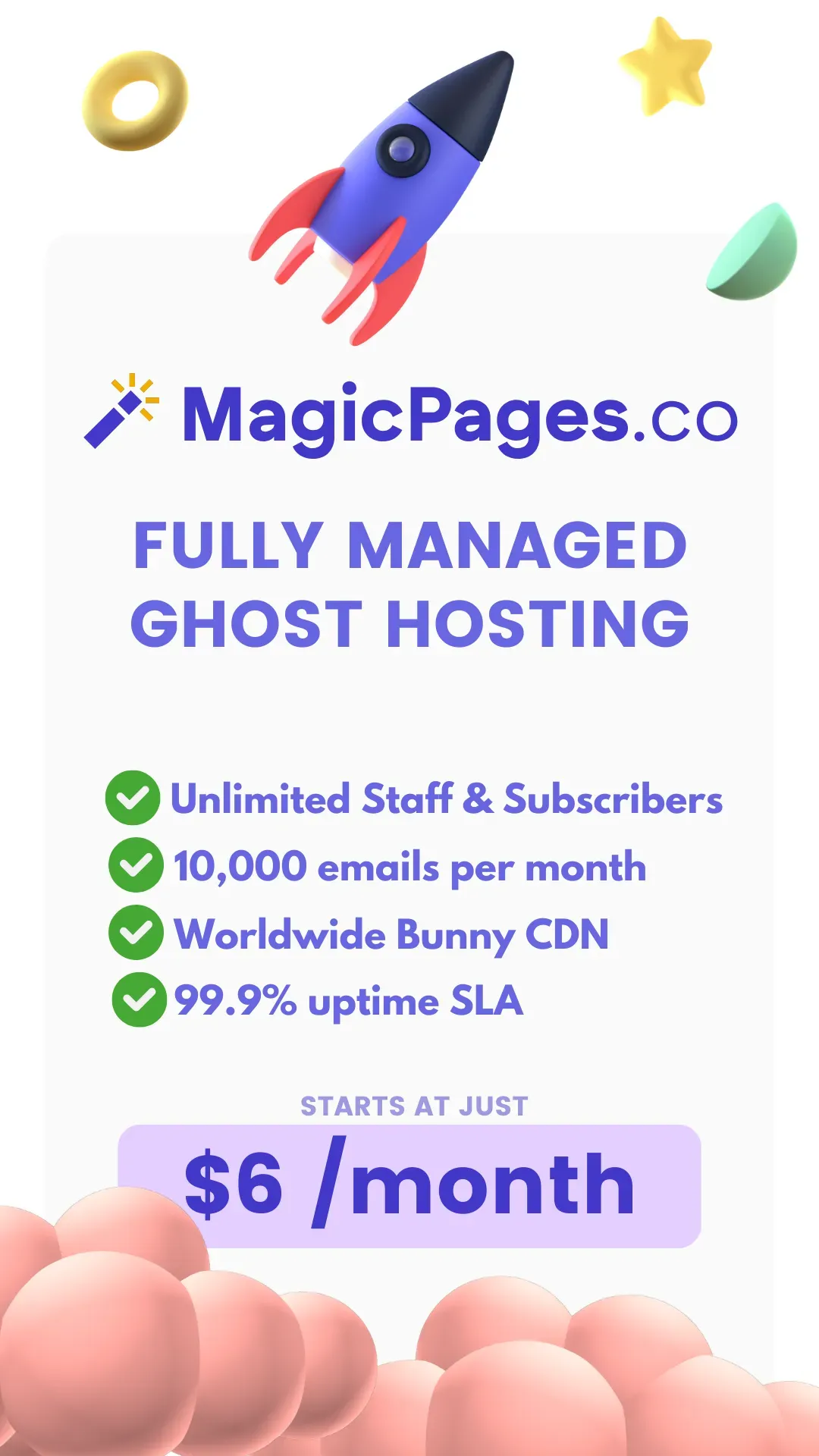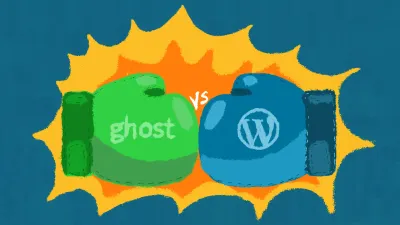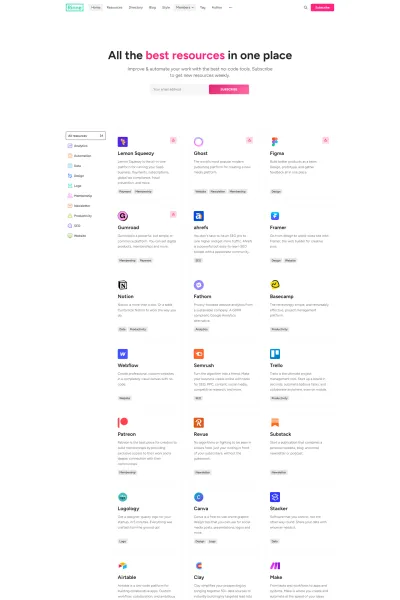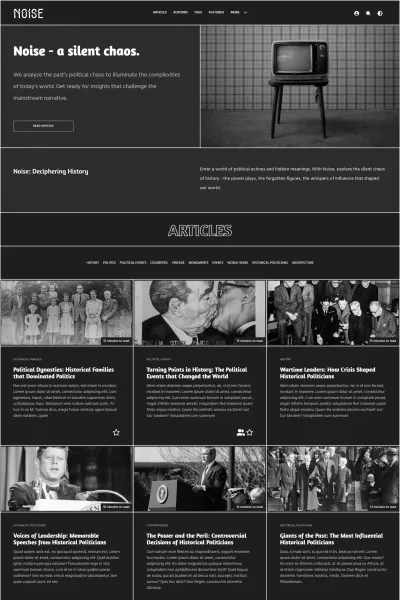This article envisions the evolution of Ghost CMS into a dynamic, AI-integrated platform by 2030. It anticipates features like augmented reality (AR) interfaces, decentralized content hosting, and community-driven models, all aimed at enhancing user engagement and content creation. The article reflects on Ghost's journey from a minimalist blogging tool to a comprehensive ecosystem, emphasizing its commitment to simplicity and performance amidst technological advancements.
Introduction
It’s 7 AM on a crisp January morning in 2030. You slide on your AR glasses 👓 and open your favorite minimalist blogging platform—Ghost. Except Ghost doesn’t feel like it did back in 2024. Instead of just a clean dashboard and markdown editor, you’re greeted by a subtle, AI-powered assistant who cheerfully says, “Good morning! Ready to shape today’s story?”
You remember when Ghost was just a sleek alternative to WordPress, primarily focused on simplicity and content purity. Now, it’s an ecosystem that feels almost alive, adapting to your writing style, readers’ interests, and the ever-shifting digital landscape.
In the late 2020s, Ghost emerged from a niche publishing platform into a refined, creator-centric system that’s redefined what blogging even means. Before we dive into the crystal ball to predict what Ghost CMS might look like in 2030, let’s set the stage: we’ll review where we’ve come from, analyze the technological and cultural trends shaping online publishing, and then imagine how Ghost might evolve into a platform that’s more immersive, community-driven, and ethically grounded than anything we’ve known before. Let’s journey into the 🔮 future of minimalist blogging together.
The Evolution of Blogging Platforms Over the Past Decade
A Brief History of Blogging (2010s–2020s)
Blogging started as an online diary phenomenon in the late 1990s and early 2000s. By the 2010s, platforms like WordPress, founded in 2003, had dominated the scene—WordPress eventually powered over 43% of all websites by 2022. Alongside it emerged players like Blogger, Tumblr, and Medium. Over time, platforms diversified: Medium offered a curated reading experience without the hassle of hosting, and static site generators like Jekyll and Hugo appealed to tech-savvy developers who craved speed and control.
Ghost, launched in 2013, entered the scene as a Kickstarter-funded project aiming to bring blogging “back to its roots”. Instead of bloated interfaces, Ghost focused on a clean Markdown editor, streamlined publishing, and built-in SEO-friendly architecture.
By 2024, Ghost had attracted a loyal audience of creators, from small publishers to large-scale media brands, and powered well over 3 million sites globally. While it wasn’t as ubiquitous as WordPress, Ghost’s ethos stood out — minimalism and performance over complexity and clutter.

A detailed story of Ghost CMS
Shift from Open Blogging to Curated Publications
The 2020s saw social media and newsletters reshape how people discovered and consumed content. Algorithms on platforms like Facebook and LinkedIn dictated what millions read daily, while newsletter platforms like Substack and ConvertKit brought the personal publishing era into inboxes.
Ghost adapted to these shifts by directly building robust membership and subscription features into the platform.
By the late 2020s, the line between a “blog” and a “newsletter” had blurred. Many Ghost bloggers evolved into micro-publishers, offering premium content, community forums, and events.
Challenges for Minimalist Blogging Platforms
The challenge has always been to maintain simplicity while adding features. A minimalist platform can feel limiting if it lacks flexibility for community interaction, newsletter integrations, or monetization tools.
Yet Ghost struck a balance: It introduced paid membership models, integrated analytics, and enhanced design flexibility without sacrificing its core principle—putting the written word at the forefront.
As we stand on the cusp of 2030, minimalism remains Ghost’s defining feature, but the world around it has changed dramatically, setting the stage for the platform’s next evolution.
Key Technological and Cultural Trends Shaping Blogging by 2030
AI and ML Integration into Content Creation
By 2024, large language models (LLMs) like ChatGPT had already begun to assist writers. Predictive text and AI-powered SEO suggestions were creeping into CMS dashboards. Fast forward to 2030, and these AI tools have evolved into highly sophisticated writing companions integrated seamlessly into Ghost’s editor.
Picture this:
- AI Co-Authors: Instead of a static spellchecker, Ghost now has an AI “co-writer” to help brainstorm post topics, suggest headings, and provide real-time style feedback. It’s like having your own editorial assistant—no extra hiring required!
- Automated Research & Fact-Checking: Need the latest stats on global smartphone usage? Your AI assistant can instantly gather verified data from reputable sources. In 2030, accuracy and trust are paramount—factual correctness is no longer a “nice to have”. It’s mandatory.
- Instant SEO Optimization: Keywords, metadata, and internal linking strategies are recommended by your AI assistant on the fly, allowing even non-technical writers to maintain a strong SEO presence.
These AI integrations streamline the editorial workflow, ensuring that what once took hours—like researching statistics or editing for tone and structure—now takes minutes, freeing creators to focus on storytelling and audience engagement.
The Expansion of the Creator Economy
The 2020s were dubbed the “creator economy” decade. According to SignalFire, over 50 million people considered themselves creators by 2021, and that number has only grown. By 2030, the creator economy is robust and diversified. Direct monetization models are the norm:
- Integrated Membership Models: Ghost led the way in the late 2020s with built-in memberships. By 2030, this functionality has evolved into marketplace-like features where readers can buy subscriptions to multiple authors in one go, or support exclusive content via micro-donations or even cryptocurrency-based token systems.
- Creator Marketplaces: Imagine discovering authors not by searching Google, but by browsing a Ghost-powered creator marketplace. Readers can find and subscribe to niche experts, supporting them directly.
Decentralization and Ownership of Content
Remember how, in 2024, concerns about Big Tech control and censorship grew? By 2030, decentralized hosting solutions and blockchain-based content ownership have become mainstream for serious publishers.
- Permanent Archiving: With hosting options leveraging IPFS (InterPlanetary File System) or other decentralized protocols, Ghost might offer “perma-web” features. Writers can ensure their content, once published, remains accessible, tamper-proof, and censorship-resistant.
- Transparent Monetization: Blockchain-backed micro-payments allow readers to verify exactly how much of their subscription fee goes to the creator. Transparency builds trust, and trust in 2030’s digital landscape is as valuable as gold.
Immersive and Multimodal Blogging Experiences
As VR and AR tech matures, reading becomes more than just scrolling through a page.
- AR Overlays: Imagine putting on AR glasses and seeing a blog’s paragraphs laid out dynamically around you. Interactive charts appear in your living room. Historical context emerges at a glance. Minimalism still reigns—the focus remains on the content—but the experience is richer and more spatial.
- Voice and Video on Demand: With advanced voice synthesis, your Ghost blog can instantly become a podcast-like experience. Readers who’d rather listen than read can do so effortlessly, and all this content is generated dynamically using AI models.
Privacy and Digital Sovereignty
The 2020s brought stricter data protection laws (GDPR, CCPA) and raised consumer awareness. By 2030, users demand absolute transparency and sovereignty over their data.
- Privacy by Design: Ghost, known for its minimalist codebase and ethical approach, incorporates end-to-end encryption for reader data and respects local privacy regulations worldwide.
- User-Owned Data: Readers can choose to “carry” their subscriber profile between different Ghost blogs. This portability gives readers and writers freedom without platform lock-ins.
Love what you read?
Get exclusive Ghost updates & new theme drops in your inbox!
The Ghost CMS Roadmap (hypothetical, of course!)
User Interface and Editing Experience in 2030
The Ghost editor in 2030 feels like a Zen garden of writing:
- Adaptive Interface Skins: Want a minimalist white space or a cozy, dimly lit interface? Ghost’s UI adapts to your mood, time of day, and writing genre. It’s not distracting; it’s comforting, like your favorite writing nook.
- Contextual Tooltips: Hover over a sentence and get suggestions for synonyms, historical references, or relevant related posts from your archive.
Intelligent Content Organization and Curation
Your content library might span hundreds or thousands of posts. Organizing it manually is passé:
- AI-Driven Taxonomies: Ghost’s backend analyzes your content and auto-generates tags, categories, and cross-links. Over time, it learns how your topics evolve, helping readers navigate older archives as quickly as your latest post.
- Personal Research Assistants: Need to recall that 2025 post you wrote on the future of solar energy? Just ask Ghost’s integrated assistant. It locates, suggests an update, and even links to newer research.
Enhanced Publishing Workflows and Integrations
By 2030, publishing doesn’t just mean hitting “publish” on one site:
- One-Click Multi-Publishing: From your Ghost dashboard, push your post to your AR streaming channel, your traditional RSS feed, and your voice-assisted home devices simultaneously.
- Visual & Audio Synopses: Readers can request AI-generated summaries in infographic form or get a two-minute audio briefing of your 2,873-word essay.
Globalization and Localization of Content
As the internet reaches deeper corners of the globe, Ghost evolves:
- AI-Driven Translation: Instantly translate your entire blog into dozens of languages. AI models don’t just swap words; they adapt metaphors and cultural references for local relevance.
- Cultural Customization: Readers in Tokyo might see a slightly different headline style than readers in New York, maximizing relatability without compromising authenticity.
Long-Term Content Sustainability and Archives
Writers often worry: Will my content last?
- Time Capsules: Ghost can create “time capsule” versions of your blog, snapshotting it annually. Readers in 2050 can browse your 2030 archive exactly as it was. This is similar to what Wayback does, but much better.
- Partnerships with Academic Institutions: Ghost archives might be preserved in digital libraries, ensuring decades-long scholarly access.
The Competitive Landscape in 2030
Ghost vs. Traditional Heavyweights
By the late 2020s, WordPress continued to be a giant, focusing on a broad range of users—e-commerce, enterprise solutions, and corporate websites. But WordPress’s complexity sometimes made it cumbersome. Ghost held firmly to its niche: a pure publishing environment, integrated memberships, and a clean user experience.
- Difference in 2030: WordPress might integrate VR and advanced site-building tools, but Ghost’s minimalist approach and content-first ethos remain a strong selling point for serious writers. It’s the difference between a multi-tool Swiss army knife (WordPress) and a handcrafted fountain pen (Ghost). Both tools create “content,” but one focuses solely on the craft of writing and reading.
Ghost vs. Emerging Decentralized Platforms
The 2030s see a rise in platforms that host content on decentralized networks from day one:
- Ghost’s Advantage: While new entrants might be entirely decentralized, Ghost offers a hybrid model, giving creators a choice. With an established ecosystem and brand trust, Ghost can integrate the best of decentralization without compromising on user experience.
Ghost vs. AI-First Content Platforms
Some platforms in 2030 generate content entirely with AI, churning out infinite articles daily. But readers crave authenticity, human perspective, and trustworthy curation.
- Human-Centric Approach: Ghost’s identity is tied to human creators. While AI assists, it doesn’t replace. In a world flooded with synthetic content, Ghost stands as the platform of choice for genuine human voices.
Niche Communities and Ghost
The future of content is community-driven:
- Ghost Hubs: Imagine clusters of Ghost blogs interconnected by shared interests, forming micro-communities or “hubs.” Each hub might offer a collective subscription, encouraging readers to support multiple authors who share complementary expertise.
Cultural Shifts and the Role of Minimalist Blogging
Reader Fatigue and the Need for Authenticity
By 2030, constant information bombardment has left many readers exhausted. Short-form content, viral videos, and algorithmic feeds have their place, but readers increasingly seek depth and authenticity.
- Ghost as a Sanctuary: Amid flashy VR worlds and AI-driven feeds, Ghost blogs feel like a quiet reading room. Minimalist formatting, human-driven curation, and genuine storytelling create a refuge for thoughtful readers.
Slow Content Movement and Digital Mindfulness
Think “slow food,” but for content. Instead of gobbling clickbait, readers savor long-form essays and in-depth analysis.
- Quality Over Quantity: Ghost’s features encourage fewer but more meaningful posts. Writers can annotate and update old posts, turning their blogs into living knowledge repositories rather than throwaway streams.
Community-Driven Editorial Models
In 2030, comment sections have evolved beyond flame wars:
- Respectful, Curated Discussions: Ghost could integrate community moderation tools and AI-driven sentiment analysis that flags harassment. The result? A calmer, intellectually stimulating discourse—a refreshing departure from the chaotic comment sections of the 2010s.
The Return of Personal Publishing and Digital Gardens
The “digital garden” concept—personal, evolving online notebooks—rose in the late 2020s. By 2030, they are widespread:
- Ghost-Powered Digital Gardens 🌱: Writers maintain blogs that grow organically. Readers wander through interconnected topics at their own pace. This approach suits Ghost’s philosophy perfectly: minimalism, authenticity, and exploration.
Monetization, Revenue Models, and Sustainability
Subscription Models Evolving
In the late 2020s, many Ghost bloggers turned to memberships. By 2030, membership models are dynamic:
- Dynamic Pricing: Subscriptions might adjust based on a reader’s engagement. Highly engaged readers could unlock bundled content from multiple authors at discounted rates.
- Tiered Communities: Some readers pay to join exclusive forums or access “office hours” with the author. Monetization isn’t just about paywalls; it’s about building value-driven relationships.
Micro-Transactions and Token Economies
The normalization of micro-payments—think “tipping” a blogger 10 cents for a well-written paragraph—has arrived.
- Universal Subscriber Wallets: Readers carry a digital wallet across platforms. They can tip, subscribe, or purchase special editions in a frictionless ecosystem. Ghost’s integration with these wallets might let writers experiment with pay-per-article, pay-per-series, or limited NFT-like content tokens.
Corporate and Institutional Adoption of Ghost
Ghost’s simplicity appeals not only to independent creators but also to organizations:
- Internal Knowledge Bases: Companies use Ghost-like systems for internal documentation, newsletters, and thought leadership platforms that reflect their brand values.
- Educational and Nonprofit Hubs: Universities and nonprofits prefer a minimalist, ad-free environment. Ghost’s accessibility and flexibility align perfectly with their missions.
The Role of AI and Automation in Content Strategy
AI-Driven Editorial Calendars
Managing a publishing schedule can be daunting.
- Predictive Planning: Ghost’s AI analyzes reader engagement patterns, global news trends, and search data to suggest optimal publishing times and topics. Think of it as your personal content strategist.
Automated Content Summaries and Personalization
Readers in a hurry? No problem:
- On-Demand Summaries: With one click, readers can get a 200-word summary or even a one-minute audio synopsis. This personalization ensures that your content reaches audiences in the format they desire.
User-Generated AI Interactions
Readers don’t just comment; they interact with your blog’s archive through AI chatbots:
- Knowledge Assistants: A reader curious about a topic you covered years ago can ask the integrated AI assistant, “What were the main arguments in the author’s 2025 series on green tech?” The assistant instantly provides a helpful summary and links.
Practical Steps for Today’s Ghost Bloggers Preparing for Tomorrow
Even though we’re envisioning 2030, there’s plenty you can do now to future-proof your presence:
- Build a Future-Proof Content Library: Focus on evergreen topics and invest time in long-form, deeply researched pieces. Quality content retains value longer than timely news blasts.
- Embrace Emerging Tools Gradually: Experiment with AI editing assistants and integrate simple membership models now. Early familiarity makes adapting to advanced features more effortless in the future.
- Foster Community and Networks: Start cultivating a loyal audience. Encourage newsletter sign-ups, host AMA sessions, and build trust with your readers. A loyal community will follow you through platform evolutions.
- Experiment with Monetization Models: Don’t rely solely on ads. Test memberships, small product launches, or tipping features. Diversifying revenue streams now ensures stability as the landscape shifts.
Conclusion
The journey from a simple blogging platform in the 2010s to a dynamic, AI-assisted, community-driven ecosystem in 2030 has been remarkable. Ghost started as a breath of fresh air in a WordPress-dominated world. Over time, it’s grown into a refined tool that still embodies minimalism, authenticity, and editorial purity—despite integrating powerful AI, decentralized hosting, immersive reading formats, and dynamic monetization strategies.
In a future where content options abound, and AI-generated text floods the web, Ghost stands as a beacon for human creativity. It reminds us that no matter how advanced technology becomes, the heart of blogging remains the same: one voice, one story, and one reader at a time. The platform’s minimalism and commitment to authentic storytelling could make it a safe haven amid digital chaos. 🌟
So, are you ready for Ghost in 2030? Whether you’re a seasoned blogger, a budding writer, or just a curious reader, the next decade promises a thrilling evolution. And here’s the best part: as a creator or reader, you have a hand in shaping this future. Share your thoughts, test new features, and explore creative ways to connect. The future of minimalist blogging—and Ghost’s place in it—is a story waiting to be written. Go forth and contribute your chapter.















